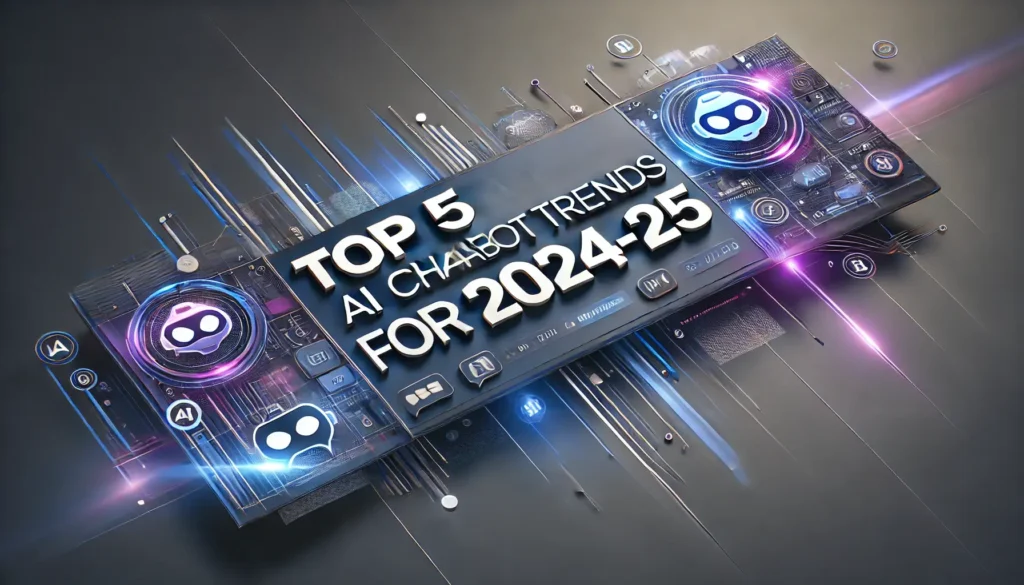Artificial Intelligence (AI) is revolutionizing the way we engage with technology, transforming industries and enhancing customer experiences. Among AI’s many advancements, chatbots are playing an increasingly vital role across sectors such as healthcare, e-commerce, and customer service. As we approach 2024-25, AI chatbots are set to become smarter, more versatile, and better equipped to meet the demands of modern consumers.
Here are the top five trends that will shape the future of AI chatbots in the coming years.
1. Hyper-Personalization and Emotional Intelligence
Trend Overview
In the upcoming years, hyper-personalization will become one of the most important trends in AI chatbot development. Consumers are no longer satisfied with generic responses; they expect chatbots to deliver personalized, dynamic interactions based on their behaviour, preferences, and past interactions.
AI chatbots will increasingly tailor their responses to users’ unique needs, making interactions feel more authentic and human-like. This means AI-powered chatbots will do more than just answer questions—they’ll anticipate user needs and deliver proactive, personalized solutions.
Real-World Applications
- Retail: AI chatbots will suggest products based on a customer’s previous purchases and browsing habits, offering personalized recommendations that improve the shopping experience.
- Healthcare: Personalized chatbots will provide tailored medical advice, reminders for medication, and support for managing chronic conditions.
The Role of Emotional Intelligence
Emotional intelligence will be a game changer for AI chatbots in 2024-25. With advances in Natural Language Processing (NLP) and sentiment analysis, chatbots will be trained to detect emotional cues in users’ messages and respond accordingly. For instance, a chatbot can sense when a user is frustrated and respond with empathy, or escalate the conversation to a human agent if necessary.
This emotional intelligence will also be essential in more sensitive applications, such as AI chatbots 18+, where personal or intimate interactions require careful handling to ensure the user’s experience is appropriate and supportive.
2. Voice-Enabled AI Chatbots
Trend Overview
Voice technology is becoming an integral part of the AI chatbot revolution. With the increasing use of virtual assistants like Alexa, Google Assistant, and Siri, more users are turning to voice commands for convenience and efficiency. Voice-enabled AI chatbots are expected to play an even more significant role in 2024-25, offering hands-free, intuitive communication.
Real-World Applications
- Customer Service: Businesses are integrating voice-powered AI chatbots into customer service systems, enabling customers to ask questions or make requests by simply speaking rather than typing.
- Healthcare: Patients can use voice-enabled chatbots to describe symptoms and receive medical advice, making healthcare more accessible.
- Retail: Shoppers can place orders or track deliveries using voice commands, streamlining the shopping experience.
Benefits of Voice Integration
The integration of voice technology will make chatbot interactions more natural and faster, allowing users to multitask and engage with services without needing to type. As voice recognition and NLP technologies improve, voice-enabled chatbots will enhance the user experience across various sectors, from healthcare to retail.
3. AI Chatbots for Mental Health and Emotional Support
Trend Overview
As mental health becomes a global priority, AI chatbots are emerging as powerful tools for emotional support and mental health services. In 2024-25, AI chatbots will become more advanced at detecting emotional states and responding to users’ mental health needs, offering scalable solutions for those who require immediate help or support.
Real-World Applications
- Mental Health Support: Chatbots like Woebot and Replika are already making significant strides by offering therapeutic conversations, tracking users’ emotional states, and providing coping strategies.
- Emotional Care: AI chatbots are designed to engage with users empathetically, offering comfort and guidance during moments of anxiety, stress, or sadness.
Why It Matters
The ability of AI chatbots to provide 24/7 support makes them invaluable for individuals who may not have access to traditional therapy services. As AI chatbots continue to evolve, their emotional intelligence will help users navigate their feelings more effectively. These AI-powered tools can complement professional therapy, offering confidential, round-the-clock assistance.
4. AI Chatbots Transforming E-Commerce
Trend Overview
E-commerce is already benefiting from AI chatbots, but the future promises even greater advancements. In 2024-25, AI chatbots will play a critical role in enhancing the shopping experience, boosting customer engagement, and driving higher sales.
Real-World Applications
- Personalized Shopping: AI chatbots can offer product recommendations based on users’ preferences, purchase history, and browsing behaviour, creating a more customized shopping experience.
- Real-Time Assistance: Chatbots are becoming adept at answering product questions, handling transactions, and providing 24/7 customer service, ensuring shoppers receive help whenever they need it.
- Upselling and Cross-Selling: Chatbots are now equipped to suggest complementary or upgraded products, increasing the average order vale and enhancing the user experience.
Impact on E-Commerce
As AI chatbots become more intelligent, they will help retailers provide a seamless and enjoyable shopping experience, resulting in improved customer satisfaction, higher conversion rates, and increased revenue.
5. Ethical Considerations and Data Privacy
Trend Overview
With the rapid advancement of AI chatbots, ethical concerns and data privacy issues will be more important than ever in 2024-25. AI chatbots collect significant amounts of personal data—such as health information, preferences, and financial records—so businesses must prioritize data protection to ensure user trust.
Real-World Applications
- Data Privacy: As chatbots enter more sensitive areas such as AI sexting and healthcare, developers will need to establish ethical guidelines to ensure that user data is handled responsibly.
- Regulations: Businesses must comply with GDPR, CCPA, and other privacy regulations to protect users’ personal information and avoid legal consequences.
Importance of Transparency and Trust
As chatbots play an increasing role in personal and intimate aspects of life, businesses need to be transparent about how they collect, store, and use data. Establishing clear ethical guidelines and ensuring compliance with data protection laws will be crucial to maintaining user trust and promoting responsible AI development.
Conclusion
As we move into 2024-25, AI chatbots will continue to evolve and reshape how businesses interact with customers. From hyper-personalization and voice technology to mental health support and e-commerce automation, chatbots will become increasingly intelligent, responsive, and emotionally aware.
However, with these advancements come significant responsibilities. Ethical considerations and data privacy will be critical factors in ensuring that AI chatbot technology is developed and used in a way that benefits both businesses and consumers.
By staying ahead of these trends, companies can unlock the full potential of AI chatbots, creating more engaging, efficient, and personalized user experiences that will shape the future of digital interaction.


